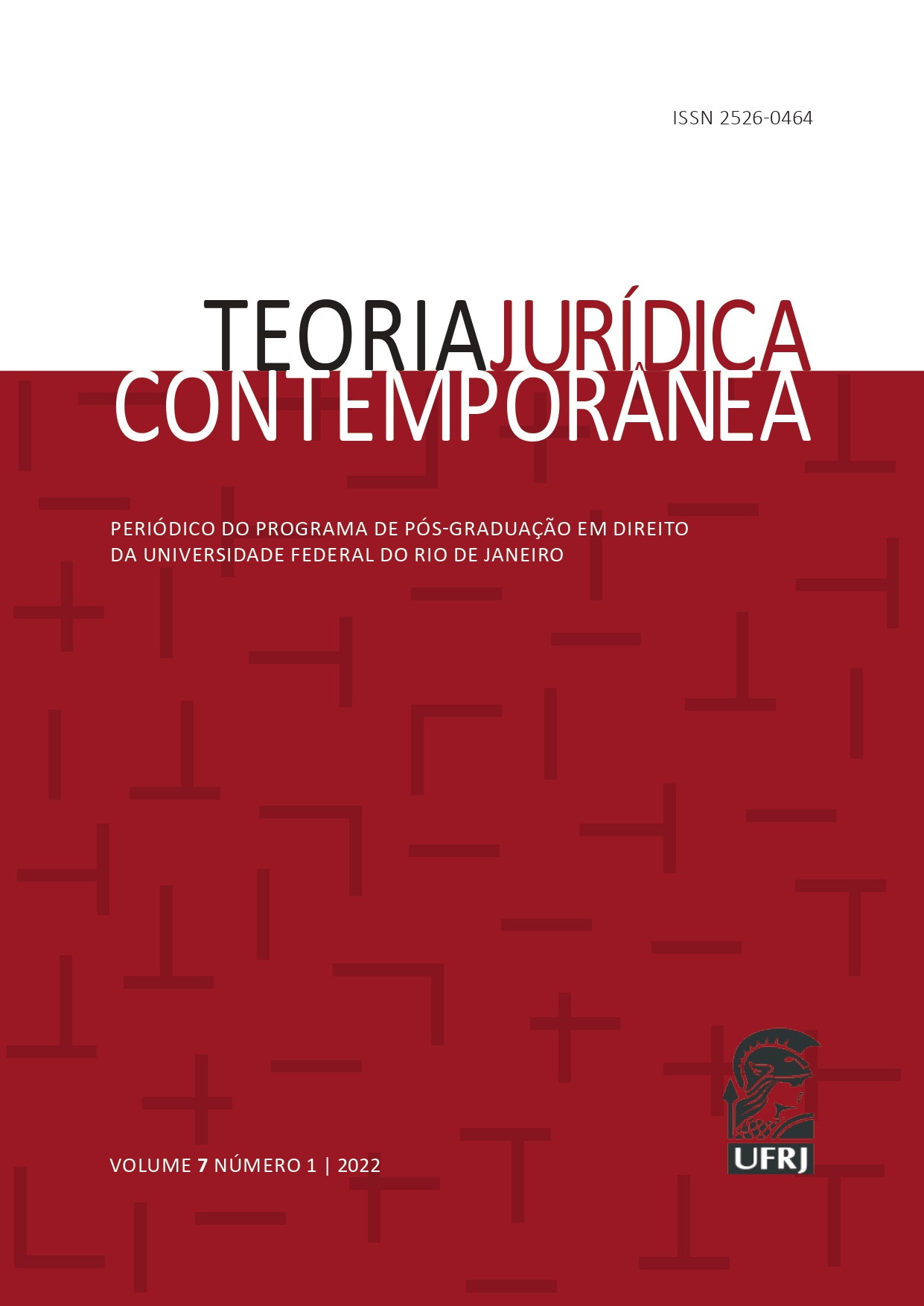LEI NATURAL E LEI CIVIL NA OBRA “LEVIATÔ DE THOMAS HOBBES
DOI:
https://doi.org/10.21875/tjc.v7i0.49041Keywords:
Leviatã. Thomas Hobbes. Lei Natural. Justiça.Abstract
Neste artigo, avalia-se o método proposto por Hobbes, na obra Leviatã, para a formação do Estado civil e a relação com as noções de lei natural e de lei civil. Busca-se compreender o papel desses conceitos na formação do estado hobbesiano e se este iria de encontro com a tese do positivismo jurídico, na qual alguns autores enquadram Hobbes como um dos precursores modernos. Verifica-se, na obra, a defesa da lei civil como critério de justiça no Estado hobbessiano, que surge a partir de um contrato regido por leis naturais, as quais não possuem uma autoridade absoluta que exija o seu cumprimento. Assim, mesmo que exista uma justiça absoluta, ela é inalcançável fora de um recorte interpretativo humano. Enquadra-se, portanto, Hobbes como “positivista de transição”.References
BERNARDES, Júlio. Hobbes & a Liberdade. Rio de Janeiro: Zahar, 2002.
BOBBIO, Norberto. Thomas Hobbes and the Natural Law Tradition. Chicago-London: The University of Chicago Press, 1993. Tradução de Daniella Gobetti.
DIMOULIS, Dimitri. Positivismo Jurídico: Teoria da Validade e da Interpretação do Direito. 2 ed. Porto Alegre: Livraria do Advogado, 2018.
GARDNER, John. Law as a Leap of Faith: Essays on Law in General. Oxford: Oxford University Press, 2012.
GOLDSMITH, M. M. Hobbes on Law. In: SORELL, Tom (Org.). The Cambridge Companion to Hobbes. Cambridge: Cambridge University Press, 1996.pp. 274-304.
GOMES, Rita Helena Sousa Ferreira. Lei Natural e Lei Civil em Hobbes. Educação e Filosofia, Uberlândia, v. 37, n. 19, p.143-164, jan-jun, 2005.
HAMPTON, Jean. Hobbes and the Social Contract Tradition. Cambridge: Cambridge University Press, 1986.
HART, Herbert L. A.. Positivism and Separation of Law and Morals. Harvard Law Review, Boston, v. 71, n. 4, p.593-629, fev. 1958.
HOBBES, Thomas. Leviatã: Ou matéria, forma e poder de um estado eclesiástico e civil. 2. ed. Tradução de Rosina D’Angina. 13ª impressão. São Paulo: Martin Claret, 2017.
____. LEVIATHAN,: or the matter, forme, & power of a commonwealth ecclesiasticall and civill. London: Andrew Ckokee, 1651. Disponível em: https://books.google.com.br/books?id=9JxkAAA AcAAJ&pg=PA147&dq=leviathan+thomas+hobbes+1651&hl=pt- BR&sa=X&redir_esc=y#v=onepage&q&f=true. Acesso em: 02 mar. 2022.
HOEKSTRA, Kinch. Hobbes on the Natural Condition of Mankind. In: SPRINGBORG, Patricia (Ed.). The Cambridge Companion to Hobbes’s Leviathan. Cambridge: Cambridge University Press, 2007.pp. 109-127.
LLOYD, Sharon A. Morality in the Philosophy of Thomas Hobbes: Cases in the Law of Nature. New York: Cambridge University Press, 2009.
MARUYAMA, Natália. Liberdade, lei natural e direito natural em Hobbes: Limiar do Direito e da Política na Modernidade. Trans/ form/ação, São Paulo, v. 32, n. 2, p.45-62, jun. 2009.
MURPHY, Mark C.. Was Hobbes a Legal Positivist?. Ethics, jul, 1995, Vol. 105, Nº 4, p. 846-873.
MURPHY, Liam. The political Question of the The Concept of Law. In: COLEMAN, Jules (Ed.). Hart´s Postscript. Essays on the Postscript to the Concept of Law.Oxford: Oxford University Press, 2001.
OLIVEIRA, Manfredo Araújo de. Filosofia Política: De Hobbes a Marx. Síntese, Belo Horizonte, v. 33, p.37-60, jan. 1985.
SCATTOLA, Merio. Models in History of Natural Law. Ius Commune: Zeitschrift für Europäische Rechtsgeschichte, Frankfurt, v. 28, p.90-159, 2001.
SORELL, Tom. Hobbes’s Moral Philosophy. In: SPRINGBORG, Patricia (Ed.). The Cambridge Companion to Hobbes’s Leviathan. Cambridge: Cambridge University Press, 2007.pp. 128-156.
STRAUSS, Leo. Natural Right and History. Toronto: The University of Toronto Press, 1965.
VAZ, Henrique C. de Lima. Escritos de Filosofia II: Ética e Cultura. 3. ed. São Paulo: Edições Loyola, 2000.
WALDRON, Jeremy. Normative (or Ethical). In: COLEMAN, Jules (Ed.). Hart´s Postscript. Essays on the Postscript to the Concept of Law. Oxford: Oxford University Press, 2001.
Downloads
Published
Issue
Section
License
The authors who publish in this journal agree with the following terms:
1. The authors maintain the copyright and grant the journal the right of first publication, with the work simultaneously licensed under the Creative Commons Attribution License that allows the sharing of the work with recognition of authorship and initial publication in this journal.
2. Authors are allowed to assume additional contracts separately, for non-exclusive distribution of the version of the work published in this journal (e.g., publishing in an institutional repository or as a book chapter), with acknowledgment of authorship and initial publication in this journal.
3. Authors are allowed and encouraged to publish and distribute their work online (e.g., in institutional repositories or as a personal page) at any point before or during the editorial process, as this may generate productive changes, as well as increase the impact and citation of the published work (See The Effect of Open Access).

This work is licensed under a Creative Commons Attribution-ShareAlike 3.0 Brazil License.

